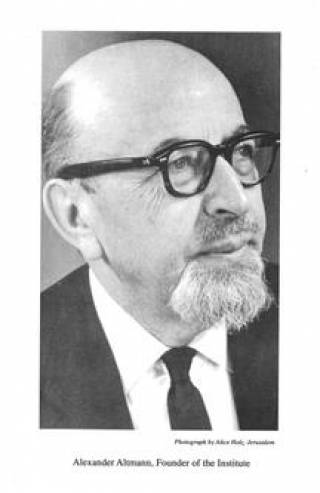On the history and future of the IJS by Sara BenIsaac written for the Winter 2021 edition of the Department of Hebrew and Jewish Studies Newsletter
Imagine a small smoke-filled room, in which are seated six or eight scholars, if not elderly certainly looking as though they are, to add to their air of distinguished erudition. All are men – not that women are barred (after all inclusivity is at the heart of UCL’s founding policy) but the entry of a female would no doubt cause a raising of eyebrows, the shake a grey beard and the shifting of a brass-studded leather armchair.
This is 1959, the year the IJS was brought under the auspices of UCL. Six years earlier German refugee Rabbi Dr Alexander Altmann established its centre in Manchester, with the aim of promoting the highest level of academic Jewish learning such as he had known in Berlin. Thus the IJS was born out of the standards of pre-war Jewish scholarship. Neoplatonic philosophy, medieval mysticism, Biblical motifs, Jewish intellectual history, all of which Alexander Altmann pursued with vigour then and in his later academic career at Brandeis University in the US, these were just some of the subjects you might have heard debated in those early years by that small dedicated group.

For many years we were maybe UCL’s best-kept secret – a small autonomous entity, delivering lectures from renowned scholars (along with a glass of wine) to anyone who wanted to hear them. Slowly our public emerged. Crowd-pulling speakers could draw in the numbers, but we were never out for popularity. Yet, amongst the multiplicity of organisations now catering to all tastes and interests in the Jewish world, the IJS has stood its ground and stayed true to its original aims.
And so to the year 2021. Imagine 300 or so little Zoom windows, popping up from all over the world, joining our latest lecture. Covid has been cruel and lockdown forced us all to re-think how we go about our lives. But there have been compensations and the corresponding technological developments a blessing. Not so long ago we were writing letters of invitation to our speakers, waiting days or weeks for a (often handwritten) reply. Now a brief email, an immediate response, a Zoom link, and we’re ready to go. How the world has changed, and especially, over the past year, have those changes been intensified in ways we could never have imagined.
Our programme of weekly term-time lectures is unrivalled and continues as it always has. We have seamlessly evolved into the online world, with 25 lectures this year alone, plus conferences and including co-operative ventures with other organisations. We are proud to have stayed true to our founding spirit, of maintaining academic Jewish scholarship, and to have reached new heights in making that accessible to the public and bringing it out into the world.
Much of our subject matter would be recognisable to that original group of scholars. Yet we don’t shy away from presenting the latest research on contemporary Jewish issues. Our programme this year has embraced Covid-19 and the ultra-orthodox communities, the mysteries of the Ark of the Covenant, German-Jewish refugees in apartheid South Africa, the role of women in Hasidism and Saadya Gaon's works on the Jewish calendar – to name only a few. All our lectures are now recorded, an innovation enabling even greater public access at any time.
And so, from fusty beginnings in tucked-away university rooms, the IJS is now beamed out to the greatest global lecture theatre of our times. To finish, there can be no more fitting tribute to our success than letting our audience speak for themselves. Here are some of the feedback comments we’ve received over the past year:
“This is an amazing programme. I’m super excited to attend. Fantastic. Well done and thank you.
“We are among the fortunate for whom the Zoom facility makes it possible to 'attend' when our chance of getting to London would be limited even at the best of times.
“I would like to congratulate you on the ongoing , extremely interesting lectures you organise and allow people from near and far to participate via zoom.
“May I say how much I am enjoying the lectures you and your colleagues are presenting; the continuing educational opportunities presented by Zoom is one of the positive things to come out of this pandemic. I am happily paying to attend lectures much less valuable than yours.
“Just to let you know that I thought the presentation was simply outstanding. This was one of the best speakers I’ve come across, and by that I don’t only mean the content of the talk but also the clarity of her voice, her diction and the passion with which she stimulated us all.
“Beautiful thoughtful lecture and talk, the richness of knowledge shared in such an unassuming way is a rare treasure. Deeply inspiring. We seldom see in academia a true intellectual who is so passionate.
Join us! Our mailing list is free and you can be kept informed of all our events.
Privacy notice for the IJS mailing list
By subscribing to the IJS mailing list your personal data (email address, name) may be used by the list owner to manage your membership, as well as send emails with relevant news and events. You can change your mind at any time by emailing ijs@ucl.ac.uk. We will treat your information with respect. By subscribing, you agree that we may process your information in accordance with these terms.
 Close
Close

